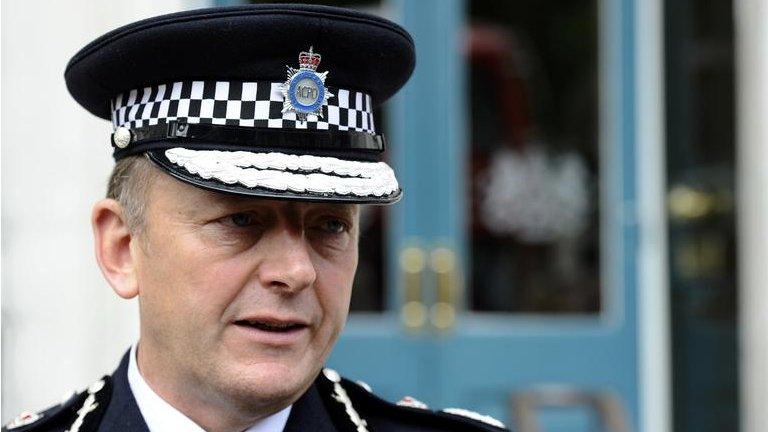Ministers defend PCC's power to sack chief constables
- Published
Keith Vaz: "There needs to be a clarification of the rules so we are clear what PCCs can do"
Ministers have insisted there are safeguards to control the powers of police and crime commissioners (PCCs), after criticism from MPs.
The Home Affairs Select Committee identified, external two cases in which PCCs had "removed" police chief constables while "sidestepping" scrutiny.
Their report said it seemed "very easy" for a PCC to remove a chief constable for "insubstantial" reasons.
But the Home Office said strict protections were in place.
PCC Martin Surl argued the police chiefs had chosen to retire.
Confrontations
The new PCCs set police budgets and can hire and fire chief constables.
They replaced police authorities in the 41 force areas spanning England and Wales but not London following elections in November 2012. Fewer than 15% of voters turned out for the PCC elections.
Confrontations have already arisen between them and chief constables.
In Gwent, Chief Constable Carmel Napier retired under pressure from commissioner Ian Johnston, and in Avon and Somerset, Chief Constable Colin Port decided not to reapply for his job.
Keith Vaz, chairman of the influential Home Affairs Select Committee, said MPs were concerned about the way some PCCs were using their powers.
"Nobody can overrule a commissioner when he or she makes up their mind to get rid of a chief constable and we've no other example of that in and elected public service."
But the government defended the process for removing chief officers, saying "strict safeguards such as consulting the independent Inspectorate of Constabulary and the local police and crime panel" were in place.
In another case, Lincolnshire chief constable Neil Rhodes was suspended by PCC Alan Hardwick but was reinstated following a High Court judgment that described the decision as "irrational and perverse".
'Too weak'
The Home Affairs Committee noted that even the home secretary was powerless to intervene if a PCC sought to force out a chief constable.
They were particularly critical of Mr Johnston who "persuaded" Chief Constable Carmel Napier to retire earlier this year.
He had provided "further evidence, if any were needed, that the checks and balances on police and crime commissioners are too weak", the MPs said.
Mr Johnston had told the committee he had a "duty to act in the best interests of the people, the electorate of Gwent".
After he decided to "take action" against Mrs Napier, he had followed legal advice on the appropriate procedure, he said.
Commissioners remove chief constables by "calling upon" them to resign or retire - but they must first give a written explanation of the reasons for the proposal and then consider any response.
Police and crime panels must make a recommendation to the commissioner within six weeks backing or opposing the plan and may consult HM Chief Inspector of Constabulary.
Neither of the two chief constables removed had ended up going through the process, the committee said.
Mr Vaz added: "It is worrying that police and crime commissioners seem able to side-step the statutory process for dismissing a chief constable. Police and Crime Panels should make more active use of their powers to scrutinise decisions such as this.
"We will be returning to this area when we carry out our next major inquiry into police and crime commissioners, towards the end of this year."
'Barking mad'
The chairman of the Association of Police and Crime Commissioners board, Tony Lloyd, countered that "in the vast majority of cases, the relationship between police and crime commissioners and chief constables have developed strongly and purposefully".
He added: "The appointment and removal of a chief constable is a duty that police and crime commissioners take very seriously.
"Police and crime commissioners and chief constables work together to decide the direction of travel of a force and police and crime commissioners have a duty to hold chief constables to account for the delivery of the most efficient and effective service for the public."
But, on BBC Radio 5Live, he conceded: "The powers of Police and Crime Commissioners do need to be looked at.
"If we had elected, for example, a member of an extremist political party or simply somebody who's barking mad - the ability to dismiss chief constables is pretty awesome."
Mr Surl, the PCC for Gloucestershire, denied that any of the cases Mr Vaz had raised involved the sacking of a chief constable.
"They chose to retire," he told BBC Radio 4's Today programme.
"Although they had been encouraged to do so, he conceded, the chief constables had "had a choice... They could have gone down the procedure of a big inquiry, or they could take their half-million-pound pension."
A home office spokesman said: "As the Home Affairs Select Committee acknowledges, it is for PCCs to make decisions around appointing, suspending and removing chief constables and down to police and crime panels to scrutinise their decisions."
- Published21 April 2016

- Published18 July 2013

- Published14 June 2013
